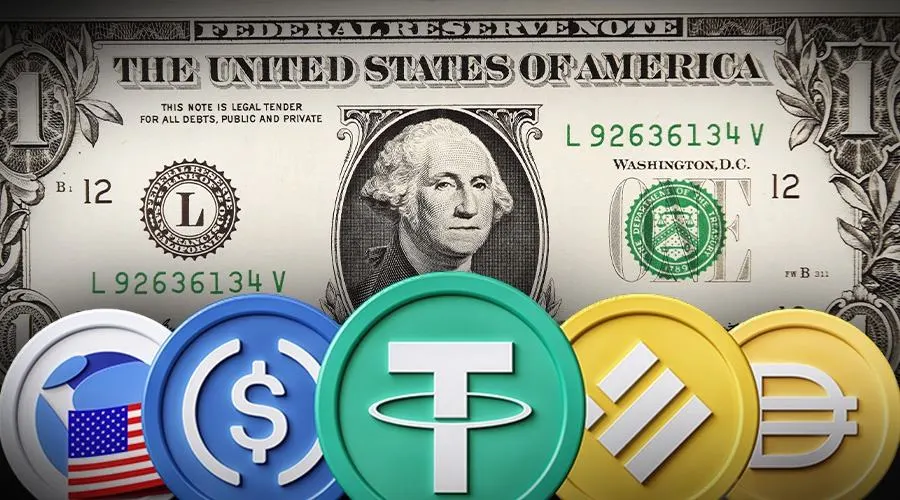Two major crypto policy efforts in the United States hit roadblocks last week, revealing a growing divide in how digital assets should be integrated into government operations. In Arizona, Governor Katie Hobbs vetoed a bill that would have allowed the state to hold Bitcoin in its reserves, calling the plan financially risky. Meanwhile, in Washington, a group of Senate Democrats who once supported a federal stablecoin framework have now withdrawn their backing, saying the proposed bill lacks sufficient safeguards.

Democratic Dissent Threatens Progress on Landmark US Stablecoin Bill
A coalition of Senate Democrats with a history of supporting the crypto industry has signaled their opposition to the current form of a Republican-led bill aimed at establishing a regulatory framework for stablecoins in the United States.
Their resistance, disclosed in a joint statement on May 3, threatens to derail a rare bipartisan effort to bring much-needed clarity to the US digital asset landscape.
Democrats Raise Red Flags Over GENIUS Act
The legislation in question, the Guiding and Establishing National Innovation for US Stablecoins (GENIUS) Act, was introduced by Republican Senator Bill Hagerty and is poised for floor consideration in the Senate this week.
If passed, the GENIUS Act would mark the first comprehensive US law focused on stablecoin oversight—an area many analysts view as crucial to safeguarding financial stability and boosting investor confidence in crypto markets.
However, despite initial bipartisan backing when the bill advanced through the Senate Banking Committee in March, nine Senate Democrats now say the bill contains “numerous issues that must be addressed.”
Among the lawmakers voicing their concerns are Senators Ruben Gallego, Mark Warner, Lisa Blunt Rochester, and Andy Kim—all of whom had previously voted in favor of the bill at the committee level. Their new position represents a significant shift in momentum.
The dissenting Democrats emphasized in their statement that they would oppose a procedural vote to move the bill forward unless it undergoes further revisions. Their primary concerns revolve around the bill’s treatment of Anti-Money Laundering (AML) provisions, national security implications, oversight of foreign stablecoin issuers, and accountability for noncompliant actors.
Other signatories include Senators Raphael Warnock, Catherine Cortez Masto, Ben Ray Luján, John Hickenlooper, and Adam Schiff.
Notably absent from the list were Senators Kirsten Gillibrand and Angela Alsobrooks, who co-sponsored the bill alongside Hagerty. Their continued silence has sparked speculation about possible behind-the-scenes negotiations to salvage bipartisan consensus.
Industry and Political Stakes Are High
For the crypto industry, the GENIUS Act is viewed as a potential breakthrough in resolving the current patchwork of state-by-state regulations. Industry leaders have long advocated for a federal framework that would define stablecoin standards, reduce legal uncertainty, and level the playing field for US-based issuers.
The latest resistance from Senate Democrats, however, could delay that progress. Floor consideration for the bill is expected to begin imminently, with a vote possibly occurring within the week. If the opposition holds firm, the legislation may be sent back to committee, further prolonging the policy vacuum that has left both investors and developers in limbo.
The legislative gridlock comes as tensions continue to mount between the crypto sector and US banking regulators. Caitlin Long, CEO of Custodia Bank, recently criticized the Federal Reserve for maintaining a policy that restricts banks from issuing stablecoins on public blockchains—despite the Fed’s recent rollback of several crypto-related supervisory guidelines.
Long pointed to a January 2023 directive—still in effect—that prohibits US banks from engaging with stablecoins on permissionless networks. She argued that only a federal law could override that position and urged Congress to act swiftly.
“Congress should hurry up,” Long said. “The Fed is protecting big-bank stablecoins while locking out innovation.”
A Fragile Bipartisan Balancing Act
The internal divide among Democrats exposes the fragile nature of bipartisan crypto policymaking in Washington. While both parties agree on the urgency of establishing a regulatory foundation for digital assets, sharp disagreements remain over how to balance innovation with systemic risk and national security concerns.
Despite their objections, the Democratic senators who signed the statement maintained they are “eager to continue working with our colleagues to address these issues.” This leaves the door open for possible compromises—but time is running short as the bill approaches a Senate floor vote.
As the GENIUS Act hangs in the balance, the future of U.S. stablecoin regulation—and potentially the broader crypto market—remains uncertain.

Arizona Governor Katie Hobbs Vetoes Bill to Add Bitcoin to State Reserves, Halting Bold Crypto Experiment
Meanwhile, Arizona Governor Katie Hobbs has officially vetoed legislation that would have allowed the Grand Canyon State to become the first in the nation to hold Bitcoin as part of its official reserves.
The decision strikes a major blow to local crypto advocates and signals continued skepticism from state leaders about the role of digital assets in public finance.
The bill, known as Senate Bill 1025 or the Digital Assets Strategic Reserve proposal, sought to authorize Arizona officials to convert seized funds into Bitcoin (BTC) and establish a reserve overseen by the state government. It passed through the Arizona House with a 31–25 vote on April 28, riding a wave of Republican support and optimism about Bitcoin’s long-term value proposition.
However, Governor Hobbs made good on her prior warnings and vetoed the bill on Friday, citing concerns over the volatility and lack of proven stability in cryptocurrency markets.
“Today, I vetoed Senate Bill 1025. The Arizona State Retirement System is one of the strongest in the nation because it makes sound and informed investments,” Hobbs wrote in a statement addressed to Senate President Warren Petersen. “Arizonans’ retirement funds are not the place for the state to try untested investments like virtual currency.”
Her decision was posted on the Arizona State Legislature’s website, drawing immediate responses from both crypto industry advocates and political critics who had hoped to use Arizona as a model for public Bitcoin adoption.
Broader Crypto Push Faces Headwinds
The veto sheds light on the growing tension between pro-crypto lawmakers and more cautious government leaders who remain wary of integrating digital assets into taxpayer-backed programs. Notably, the bill would not have impacted traditional retirement accounts directly, but Governor Hobbs drew a parallel between conservative investment policies and her broader fiscal philosophy.
The legislation was one of two related Bitcoin bills under consideration. A companion bill, SB1373, which would authorize the Arizona state treasurer to allocate up to 10% of the state’s rainy-day fund to Bitcoin and other digital assets, is still awaiting a final vote. That bill may now face similar resistance from the Governor’s office.
Arizona’s efforts mirror failed attempts in other states such as Oklahoma, South Dakota, Montana, and Wyoming, where similar digital asset reserve proposals have either been vetoed, stalled, or withdrawn due to political friction or fiscal concerns.
In contrast, North Carolina has taken a notably different path. On April 30, the state’s House passed the Digital Assets Investment Act, allowing the treasurer to invest up to 5% of specified funds into approved cryptocurrencies. The bill has since advanced to the state Senate and has been viewed as one of the most significant state-level pushes for digital asset adoption in public finance.
Crypto proponents view these measures as essential steps toward financial modernization and hedge strategies in an era of growing distrust in fiat monetary policy. They also argue that cryptocurrencies like Bitcoin offer long-term protection against inflation and geopolitical risk.
Federal Momentum and the Trump Factor
While state-level crypto bills face mixed outcomes, momentum is building at the federal level, largely driven by President Donald Trump and his Republican allies.
In March, Trump signed an executive order proposing the creation of a “Strategic Bitcoin Reserve” and a broader “Digital Asset Stockpile,” signaling a more bullish federal stance on integrating crypto into national economic strategy.
Trump’s initiative, along with GOP-backed legislative proposals, marks a sharp contrast with the Biden administration’s more cautious tone toward cryptocurrencies during its term. His administration aims to challenge what many on the political right see as overreach by banking regulators and the Federal Reserve, especially concerning private crypto use and stablecoin issuance.
Reactions to Hobbs’ veto have been swift. Pro-crypto lawmakers in Arizona argue that the state is missing an opportunity to diversify its financial holdings and build a forward-looking investment strategy. Others accused the Governor of aligning too closely with traditional banking interests, at the expense of innovation.
What’s Next for Arizona?
Despite the setback, the fight is not necessarily over. Proponents of Bitcoin reserves could reintroduce revised versions of the bill in future legislative sessions. The survival of SB1373 may also hinge on whether lawmakers are willing to amend its provisions to gain the Governor’s support.
For now, Arizona joins a growing list of states struggling to define the role of digital assets in government operations. With national crypto policy still in flux and states experimenting with their own approaches, the road to mainstream adoption remains anything but smooth.



